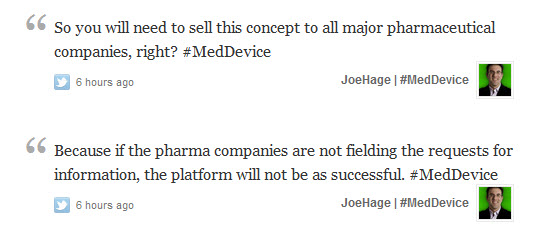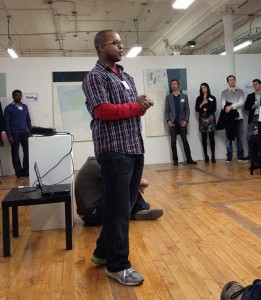
Rashaun Sourles, CEO of med-tech start-up NEEDL, thinks he has the answers.
So does Blueprint Health, New York’s only healthcare incubator, who just invested $20,000 in his venture.
Rashaun slipped out of an industry event early to chat with us on #MedDevice.
Joe Hage: Rashaun, tell us about needl.co, the company you founded.
Rashaun Sourles: NEEDL allows healthcare providers to interact with vendors online using a private twitter-like platform.
Joe Hage: Your primary insight is “Physicians, pharmacists, and supply chain managers are no longer engaged with pharma reps who call on them.” Is that right?
Rashaun Sourles: Essentially, yes. Many healthcare institutions ban reps. Healthcare delivery is more complex. The chain of influence to get a drug onto a hospital or health system formulary has changed significantly.

Joe Hage: So, Blueprint Health? Tell us about that.
Rashaun Sourles: Yes! We are in New York for three months as part of the inaugural class of Blueprint Health, NY’s only healthcare incubator.

Joe Hage: Wow. Congratulations! Tell us, how intense was the competition and what was your pitch?
Rashaun Sourles: There were 300 applicants and we are one of only nine teams. We were selected because of our drive and commitment to solving a major problem in the healthcare space. Also because Blueprint is very focused on disruptive B2B biz models.
Joe Hage: Fantastic. When I visited your website, it shows that you are not yet up and running. What should I expect when you launch?
Rashaun Sourles: We are in private beta now; the site you saw is for visitors interested to learn more. When we launch, we see pharmacists, physicians, and hospital supply chain managers posting questions to industry for information about drugs they are prescribing.
Rashaun Sourles: We are confident they will. Pharma needs new ways to reach their customers. Monday’s WSJ painted the picture of a burning platform in an article titled “Drug Reps Soften Sales Pitches.” We will provide up-to-date customer insights to pharma. They will gain the most when they actively participate since each need by the healthcare provider is an invitation to interact.
Joe Hage: Do you foresee charging the pharma companies for access? Is that your business model?
Rashaun Sourles: NEEDL has had to find the delicate balance of what industry can and can’t pay for.

You will find this interesting: The consumers of the information (the physicians, etc.) expect pharma to fund the business model. They aren’t about to pay for information about the drugs they prescribe. They just want the resources we can more efficiently broker in our model.
Think of it as a pull strategy versus pharma’s traditional push model.
Joe Hage: Can you share some results from your beta test?
Rashaun Sourles: Yes, and thank you for that question.
We’ve had some big wins. Our beta site procured contracts saving a hospital thousands of dollars.

When they went out on NEEDL looking for better pricing, pharma reps on the other side of the equation responded. NEEDL enabled them to crowd source the solution (in this case, a contract).
At our beta site, the hospital gave us a list of 200 sales reps (from more than 130 companies) they wanted to use the NEEDL platform. In fact, our hospital client changed their vendor policy to drive adoption to NEEDL from the reps from Pharma.
We were able to get a good number of big pharma salespeople to engage and smaller companies as well. This kind of response is very encouraging for us regarding adoption and usage.
Joe Hage: Sounds like a real win for everyone, Rashaun.
Tell me, do you think there is a lesson here for medical device sales?
Rashaun Sourles: Doctors still find value in interactions from device reps because there is training involved. The problem is, healthcare institutions are beginning to reign in device procurement in the same way pharma has been reigned in via closed formularies so there’s going to be conflict once insitutions try to apply supply chain management principles to the device category.
The implication for medical device sales? Recognize the chain of influence is changing for you too. Just because surgeons generate profit for the institution doesn’t mean they can escape the purview of supply chain managers in our new outcomes-driven healthcare economy.
Joe Hage: Rashaun, thanks for your insights tonight. I wish you success in the coming months. Check in and let us know how it’s going for you after the public site launches.
…
>>> Click to review the archive of #MedDevice chats you missed! <<<
Join the Medical Devices Group on LinkedIn to network and grow your business. #MedDevice is held most Wednesdays, 4 p.m. EST. We interview the medical device industry’s best minds and cover issues including sales, reimbursement, distribution, EMRs/HIT, regulations, and Marketing Medical Devices.









